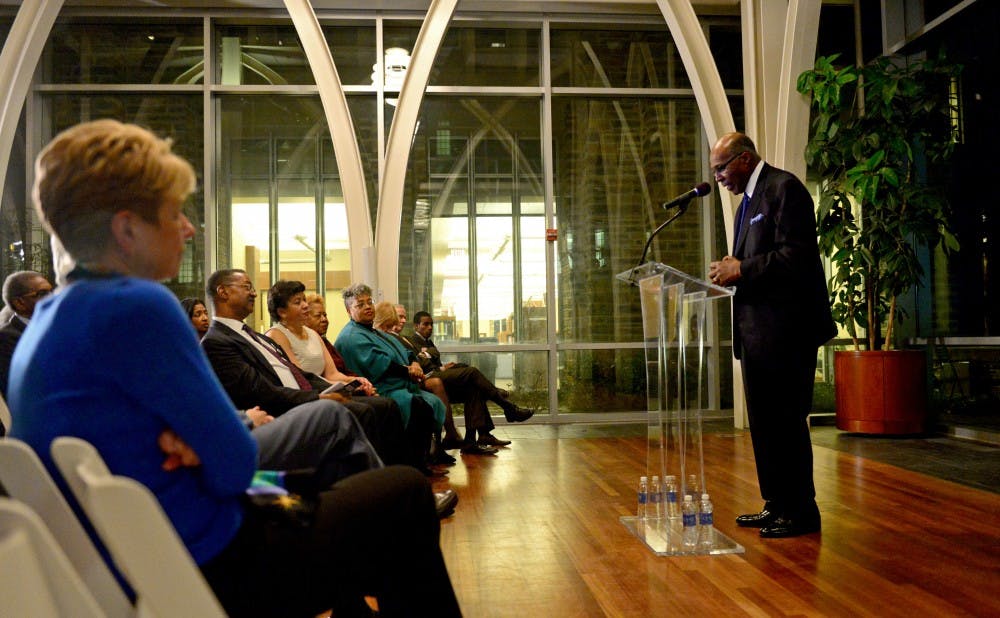The centennial celebration commemorating the life of historian John Hope Franklin kicked off Wednesday night.
The event—titled John Hope Franklin@100: Scholar, Activist, Citizen—featured an opening speech by President Richard Brodhead and served as the start of a yearlong celebration of the 100th birthday of the prominent historian and author, who taught at Duke for nine years and held emeritus status for 17 more.
“John Hope Franklin was a scholar, an activist and a citizen,” Brodhead said during his speech. “The principle of the work he did as an activist was done as a scholar, and the principle of what he did as a scholar was done as a citizen.”
Franklin—who grew up in Oklahoma—received his doctorate degree in history from Harvard University in 1941 and taught at Howard University, Brooklyn College and the University of Chicago before coming to Duke in 1983 and becoming a James B. Duke professor of history. From 1985 to 1992, Franklin also served as a professor of legal history at Duke University Law School and held emeritus status until he passed away in 2009 at the age of 94.
Vernon Jordan—a civil rights activist, lawyer and former adviser of Bill Clinton—was the main speaker at Wednesday evening's event.
“[Franklin] was a giant in the study of American history and a giant in American history himself,” said Jordan, who is also a longtime family friend of Franklin.
Franklin served as a member of the NAACP Legal Defense Fund team in the 1950s and was appointed to several national commissions over the decades, eventually being awarded the Presidential Medal of Freedom in 1995. His 1947 book "From Slavery to Freedom" is credited with helping to create the field of African-American studies, and his lecture series "Racial Equality in America" is used as a history textbook in schools across the nation.
Wednesday evening, Jordan reflected on recent events stirring national conversations on racial equality—noting that Franklin’s legacy should be a source of inspiration when it comes to addressing situations like the one in Ferguson, Mo.
“We can talk about John Hope Franklin’s legacy, his scholarship.... But John Hope Franklin...would not want us to treat his legacy solely in retrospective," Jordan said. "He would want us to see it as a prospective one as well.”
Jordan went on to discourage violence in social upheaval and emphasized the importance of “peaceful revolution.”
“Rioting is not the solution and assaulting and blaming the police is not the solution,” Jordan said. “I don’t believe it is, and John Hope Franklin wouldn’t either.”
The event was hosted by Black Student Alliance president Jamal Edwards, a junior, and ushered by volunteers from Alpha Phi Alpha Fraternity, of which Franklin was a member. The Von der Heyden Pavilion was full, with approximately 60 attendees.
“[My mother] followed John Hope Franklin as a student, so I grew up hearing about him,” said Lucy Reuben, an adjunct professor at the Fuqua School of Business who attended the event. “He was a kind and gentle soul, in addition to [being] a great light of hope, a person of great insight and certainly a great role model in academics.”
The celebration of Franklin's life will continue throughout the year and feature events such as faculty symposiums, lecture series and documentary screenings.
“Doing this for a whole year is extraordinary,” said Durham resident Virginia White, who attended Wednesday's event. “Everybody should know John Hope Franklin and what he has done for the community and what he has done for African-Americans. I think Duke is doing an excellent job.”
Get The Chronicle straight to your inbox
Sign up for our weekly newsletter. Cancel at any time.

